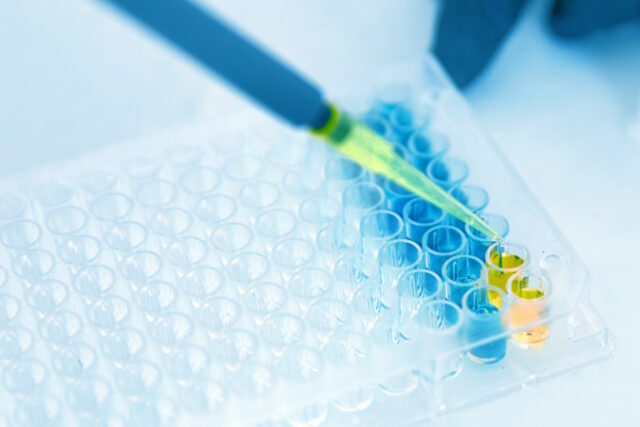
Personalized peptide therapy is poised to be the future of cancer treatment, but many people don’t know exactly what it is. To understand peptide therapy, it’s important to first define a peptide.
In a nutshell, peptides are chains of up to 50 amino acids or short proteins. Peptides exist naturally in the body, and people have discovered how to manufacture them as prescription drugs. Dr. Nathan Goodyear, medical director of Brio-Medical, a holistic, integrative cancer healing center in Arizona, says personalization is the next evolution in peptides in medical treatments.
Peptides vs. personalized peptides
Insulin, discovered in 1921, was the first peptide commercially produced for mass medical use. Today, there are two distinct types of peptide therapy: off-the-shelf peptides and personalized peptides.
Off-the-shelf peptides include hormones, neurotransmitters, growth factors, immunomodulation, anti-infective agents, and ion-channel ligands. These treatments are one-size-fits-all interventions — an approach that has dominated medicine for the last 100+ years.
In contrast, personalized peptides embrace the future of personalized medicine — multiomics. “At its core, multiomics is a revolution in the therapeutic approach to medicine,” explains Dr. Goodyear. “The past 100 years of medicine have sought to treat the masses, but personalized medicine aims to treat the individual.”
To deliver individualized therapy with targeted peptide treatment, researchers evaluate genomics, exomics, epigenomics, transcriptomics, proteomics, metabolomics, and immunomodulomics.
Genomics is the study of an individual’s entire set of genes, whereas epigenetics looks at how the genes express themselves due to the environment. Transcriptomics is the study of the biochemical process in which DNA is encoded into ribonucleic acid (RNA), while metabolomics studies the individual function of a person’s metabolism, and Immunomodulomics examines a person’s immune system and its impact on overall wellness.
How can personalized peptide therapy treat cancer?
When treating cancer, personalized peptides work differently than conventional medicine. While traditional cancer treatments obstruct or destroy cancer growth, peptides promote optimal physiologic function through hormone mimetics, homeostasis, and balance.
“We can look at our bodies as 10 million working parts,” Dr. Goodyear says. “To achieve overall health, all those parts must work together. Peptides bring those parts into balance and optimal performance.”
Precision peptides are the answer for those seeking advanced and individualized cancer therapies. Precision medicine involves targeting therapy to achieve a specific result in a specific individual. In target practice, this is called a bullseye.
The precision use of peptide therapy looks at a patient’s body, environment, genetics, and cancer to target their unique tumor. From there, peptide therapy can target components within the tumor’s microenvironment, specific cancer pathway signaling, molecular augmentation, specific immune dysfunction, immune evasion, immune augmentation, and holistic healing.
“Peptides provide a precision and targeted therapeutic approach to meet each person’s unique characteristics, environment, and specific cancer,” Dr. Goodyear remarks. “No longer can we view cancer types as homogenous, identical collections of cells. Cancer is a complex and individual process. It involves increasing cellular heterogeneity, an evolving microenvironment, unique molecular and signaling modification, and immune dysfunction.”
According to Dr. Goodyear, this progressive heterogeneity of cancer — ultimately leading to metastasis, morbidity, and mortality — can only be countered through a new approach to cancer therapy. “A personalized approach targets only the bad cancer cells, not a person’s healthy cells,” he explains. “This highly specific targeting can only be accomplished with precision peptides. In the words of the CEO and co-founder of Neo7Bioscience, ‘Precision medicine ensures delivery of the right intervention to the right patient at the right time.'”
One-size-fits-all cancer treatments are the same for each patient, whereas precision peptides don’t exist until they are created through rigorous testing and personalized design. Each one is designed to meet the needs of a specific individual, cancer, and immune dysfunction, respectively.
Cutting-edge cancer treatment solutions on the horizon
Dr. Goodyear predicts that the future of the war on cancer will take place in the arena of multiomics. “What is most exciting about this multiomic future of patient care is that we, as clinicians and patients, don’t have to wait for the future,” he says. “The future is available today.”
According to Dr. Goodyear, he envisions a future of cancer care divided into three primary fields: prevention, treatment, and healing. He says all three fields will incorporate precise clinical applications through multiomics, and says the principle of therapy stacking will soon dominate cancer therapy. No longer will cancer care equate to the sequential stepping stones of surgery, chemotherapy, and radiation in isolation. Instead, therapies will be stepping stones and precise sequencing and combination to stack systemic and physiologic effects and impact.
“The most exciting component in cancer care will be the stacking of natural, holistic, and integrative cancer therapies with conventional cancer treatments,” Dr. Goodyear says. “Tomorrow’s treatment regimens will focus on healing potential, rather than just disease management. This exciting future of precision cancer care for each individual will limit the need for the increasingly archaic triad of surgery, chemotherapy, and radiation. They provide intervals of remission, but their respite is all too often short-lived. Patients who beat cancer with conventional treatments regularly experience mutation, recurrence, resistance, metastasis, and even new cancers.”
The future of cancer treatment is less about a new therapy and more about a return to purpose. Personalized therapy enables medicine, physicians, and doctors to re-dedicate themselves to the purpose of hope, healing, teaching, and serving each patient’s unique needs.
In the not-so-distant future, cancer patients can take advantage of this return to focus and maximize their healing potential through the targeted cancer care of precision peptides.












